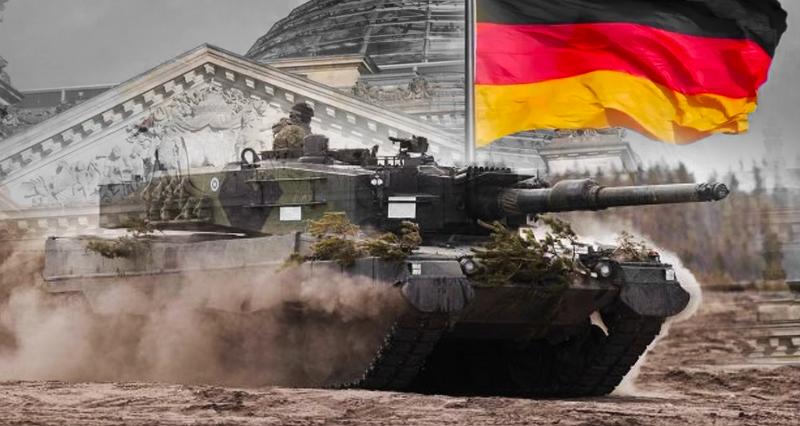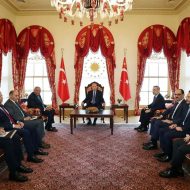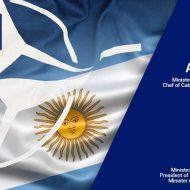The German government has decided to send 14 Leopard tanks to Ukraine and permit the re-export of others from other countries. On January 25, the German parliament debated on the issue on demand of the oppositional fractions of the CDU/CSU.
The parliament debated the issue as an extraordinary item on agenda upon demand from the oppositional CDU/CSU. The main opposition party had asked for the discussion. It’s petition was titled “Lifting the Federal Government’s blockade on Leopard deliveries – not losing any confidence of the Allies”.
The party had presented the demand to the parliament before the government announced its decision to deliver the tanks.
So, what are the arguments presented in the parliament by government and opposition in regards to the issue? Why has the government taken that decision, and what arguments are brought against it?
The debate has been published on the parliament’s website here and here. All translation from German are by UWI.
Let’s take a look:
Chancellor Scholz: “Correct we insisted on not being pushed”
Chancellor Olaf Scholz (SPD) opened the session with a speech emphasizing his government “had blown off any economic crisis or winter of anger”. Reminding the German military and financial support for Ukraine till today Scholz added “we will continue to do anything possible to support Ukraine while at the same time avoiding a war between NATO and Russia”.
Scholz announced that “following intensive deliberations with our partners” two tank battalions (approximately 108 tanks) would be established. He insisted that “it was correct that we did not allow being pushed and instead bet on close cooperation”.
Germany will provide staff training, logistics, ammunition and maintenance of the tanks, said the Chancellor. He added “with close international coordination, we will avoid that risks for our country grow into a wrong direction.”
Lars Klingbeil (SPD): “Great diplomatic victory”
Governing coalition’s social democrat MP Lars Klingbeil also repeated Scholz’ guiding principles of “never acting alone, always acting in coordination with allies and never making Germany to a party in the war”. Klingbeil described the decision as a “great diplomatic victory”.
Claiming that Putin is “a war criminal”, Klingbeil described German acts in the conflict till today. “We have broken a principle of foreign and security policy by delivering arms into a conflict zone to enable Ukrainians to defend themselves. (…) It was our weapons that helped stopping Russian forces and regaining territory and cities.”
Michael Roth (SPD): “Achieving peace with weapons”
Michael Roth from the same party stated “this is a bad day for Russian nationalism and imperlialism that has spread fear and shock over the entire European continent”. Calling the government’s decision “brave and far-reaching” Roth demanded a “full withdrawal of Russian forces from Ukrainian territory”.
Roth continued: “I grew up in a generation educated by the slogan ‘peace without weapons’. Today I say: More weapons bring us closer to peace’”. The MP said this sentence had to be explained well to the population that confronts politicians daily with questions and skepticism.
The MP argued that Russian President Putin would only be “truly willing to negotiate if he loses” and that Ukraine could only finish this war “from a position of military strength and superiority.”
Rolf Mützenich (SPD): Intelligent foreign policy is “more than delivering weapons”
Another MP to speak on behalf of the SPD was Rolf Mützenich, who previously had signed petitions for a negotiated solution in the conflict. Stating the Ukraine had the right to defend itself and by that, it was “ensuring the security of Germany” too, Mützenich continued:
“We need to acknowledge the number of countries worldwide that do not follow our interpretation of a war of aggression. These countries need to be accessed and convinced diplomatically.”
Mützenich closed by saying that “intelligent foreign policy is more than the delivery of weapons – as is the promise of the SPD.”
Deborah Düring (Alliance 90 / The Greens): sustainable and feminist reconstruction of Ukraine
Another MP speaking from the governing coalition was Deborah Düring from the Greens. She expressed her full support for the decision and warned that solidarity with Ukraine should also include Ukrainians inside Germany.
Düring stated that the reconstruction of Ukraine should also be taken on the agenda, in a way “that not only opens the path to Europe but is also sustainable, inclusive and feminist”.
Jürgen Trittin (Alliance 90 / The Greens): “Common ground in NATO to avoid escalation”
For the same party spoke also Jürgen Trittin. Trittin is a veteran politician with a long history in pacifist movements. He also supported the decision, saying “the help is necessary but not enough. A Russian offensive is expected in spring and without the military support, Ukraine will not be able to stop Russia”.
Stating hat “who changes borders by military force “also endangers peace and security here in Germany”, Trittin acknowledged that the German population is divided on the issue with the fear of a possible escalation towards a NATO-Russia war.
“But the danger of escalation must not become a free-ride-ticket for criminals who believe to have control over escalation. The best way to avoid escalation is to achieve common ground in the NATO”, concluded Trittin.
Ulrich Lechte (FDP): “All brakes have been released now”
The liberal democrat FDP is another member of the governing coalition. On behalf of the party spoke Ulrich Lechte: “I am thankful that all the brakes on the Chancellor have been released now”, Lechte said.
Lechte defended the military help by saying that “all our multilateral components did not suffice”. He rejected claims that the British government of Boris Johnson had stopped a last-minute-agreement between Russia and Ukraine before clashes as “conspiracy theory and nonsense”.
Alexander Müller (FD): Thankful to “a number of social democrats” too
Another MP speaking for the FDP was Alexander Müller. Müller said “Ukraine in its current form and shape would not exist without Western weapons.”
Concerning the decision to send tanks, Müller expressed his thanks to “my party, the Greens, the CDU/CSU and a number of social democrats who took the right decision”, making different opinions within the SPD apparent.
Friedrich Merz (CDU/CSU): NATO and EU “do not trust this German government”
The opposition in the parliament was divided in regards to the government decision. The main opposition party, the Christian democrat CDU/CSU supported the decision and criticized the government for having been to slow to take it. The Left and the Alternative for Germany rejected the decision.
Friedrich Merz was one of the MPs to speak on behalf of the CDU/CSU. He called the decision “correct and appropriate”. It had become “obvious for Ukraine and allies that heavy weapons were needed. Only the government’s position has delayed the right step”, Merz stated.
“I reject the perception that the decision was taken in consensus with our European allies. The contrary is true” Merz said, and added: “The Chancellor has left partners and allies in the dark for weeks and months” about why was delaying the decision.
Merz claimed that there was “a heavy discord between the U.S. Secretary of Defense and some members of the German government” during the meeting in Ramstein. He also criticized that Scholz had not used his recent meeting with the French President to announce the decision.
Merz said despite the decision, the damaging impression in NATO and EU that “this government cannot be trusted and needs to be pushed to decisions” was going to stay.
Jürgen Hardt (CDU/CSU): Government “has no great plan”
Jürgen Hardt on behalf of the CDU/CSU reported from his participation in the parliamentary commission on foreign and security policy. “I asked how this decision was going to be implemented, and I received no concrete answer.” He said.
Hardt stated that colleagues from the commission for defense reported a similar situation, “where they could not even confirm the number of available tanks”.
“There is no great plan here presented by the genius Chancellor”, concluded Hardt his remarks.
The Left and the Alternnative for Germany (AfD) were the two oppositional parties that rejected sending tanks to Ukraine altogether.
Dietmar Bartsch (the Left): Coordinated European peace initiative needed
Condemning “Putin’s attempt to change borders clearly”, Dietmar Bartsch presented a number of objections.
Stating that the Chancellor had “given in”, Bartsch declared his party considers it a “wrong decision” to send tanks. Bartsch continued: “Defense Minister says first tanks will be in Ukraine in 3 months. What a perspective! The goal should be that in three months, there is no war in Ukraine anymore.”
Bartsch declared the German parliament “should seek a consensus to end the war as soon as possible”, criticizing that the past 11 months since begin of clashes have only shown more and more escalation. He claimed that in contradiction of the parliament’s majority, the population overwhelmingly rejected the decision.
Given the Russian resources and the readiness in Moscow, this conflict will “further escalate if we don’t quit the logic of war”, he warned. Bartsch said the majority of the international community of states had not sent “one single bullet” to Ukraine. “This majority of the world knows that a nuclear power cannot be defeated militarily”, Bartsch said.
All hesitation to send German tanks into a war with Russia is “justified in light of our own history, where 27 million Soviet citizens were killed”, Bartsch stated. He finished his words by “calling the government to present a coordinated European peace initiative”.
Tino Chrupalla (AfD): “Remember Stalingrad” and don’t serve “so-called friends” in the U.S.
Speaking for the Alternative for Germany (AfD), Tino Chrupalla began criticizing the main opposition party CDU/CSU: “Your job has become to show the same warmongering as the governing coalition”, he said.
Chrupalla also criticized the government for a lack of strategy and asked, whether it wanted to provoke a case of NATO’s collective defense clause. He also asked what had happened to the weapons previously delivered to Ukraine. The MP stated the German government was “plundering” the defense resources of the German military.
Rejecting the decision for “actively prolonging the conflict and preventing peace efforts”, Chrupalla said “you are heading knowingly towards the Third World War, dragging Germany into it and throwing the country into darkness”.
As his colleague from the Left, Chrupalla also reminded of history: “On February 2nd is the 80th anniversary of the Stalingrad battle. I recommend all of you to visit one of the memorial sites. Almost all of us will find a relative buried there” he said.
Chrupalla claimed this war “served nobody on the European and Asian continent”. Europe and Germany are carrying “an unequal weight” of the conflict within the alliance, the MP claimed, and continued: “Our so-called friends from the U.S. are setting the situation more and more on fire. Their defense industry makes good profits and restores the bankrupt state budget, while they don’t have to worry about security, which is increasing in Europe.”
The MP for AfD concluded: “We say ‘yes’ to alliances, but nor for the price of self-abandonment. Europe needs peace and a sovereign place in the world. The German government must first serve the interest of the German people.”









Leave a Reply